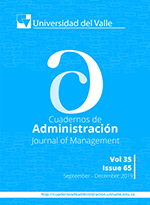The potential market for sustainable housing under the contingent valuation method. City of Palmira
Keywords:
Sustainable housing, Environmental impact, Potential market, Contingent valuationMain Article Content
Sustainable housing is the constructive alternative under discussion in recent decades due to the multiple environmental impacts produced by the construction sector and its state of permanence and acceleration. Policies and standards at the international and national levels quickly encourage the implementation of actions in its favor. The lack of a market and the need to know it justify the research objective hereof of exploring the willingness to pay for sustainable housing through the Contingent Valuation Method applied to the city of Palmira, Colombia. A case of interest, as it is an emerging intermediate city regarding urban growth in the last decade in Colombia. The method designed a survey through the identification and valuation of significant variables for sustainable housing and the parameters of the analysis model and the method, which allow it to identify the potential market for sustainable housing. It is observed that the main variables of analysis in the literature consulted refer to topics such as location in relation to nearby equipment, materials’ properties, technological innovation and reduction in consumption of home public services. The survey shows that the willingness to pay in the city of Palmira is high for the lowest housing prices, and that the people with the highest income are the ones who would invest the most in sustainable housing and that the level of knowledge on the subject is scarce in general.

